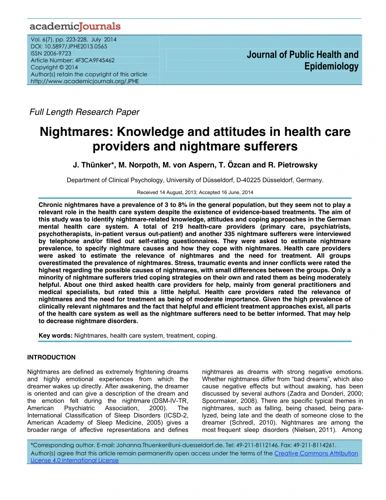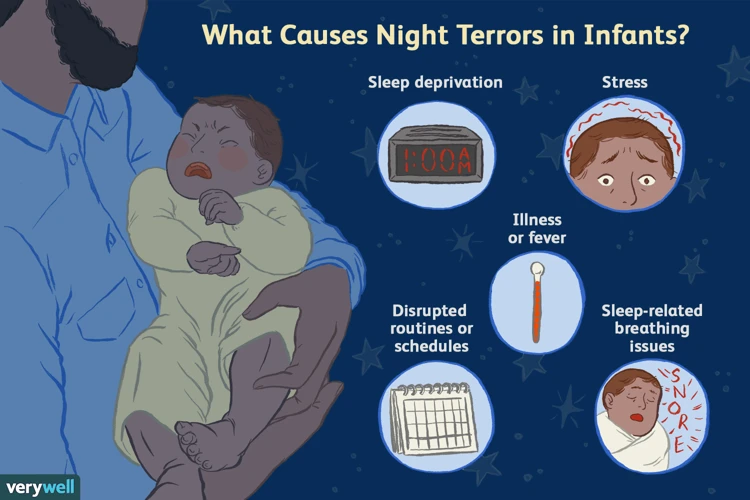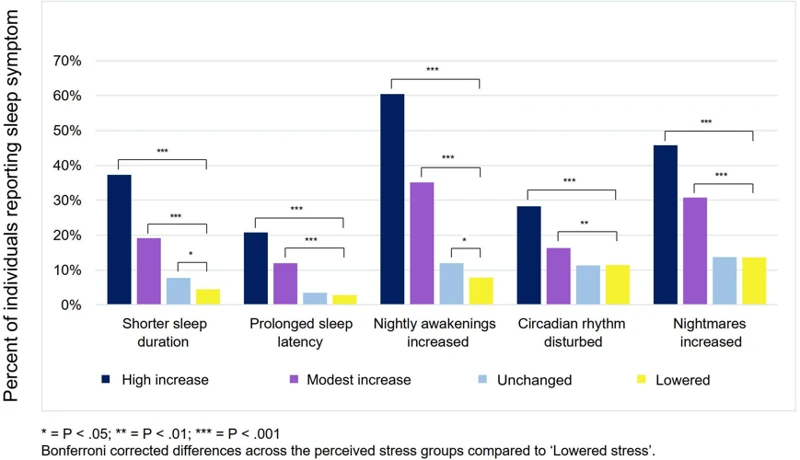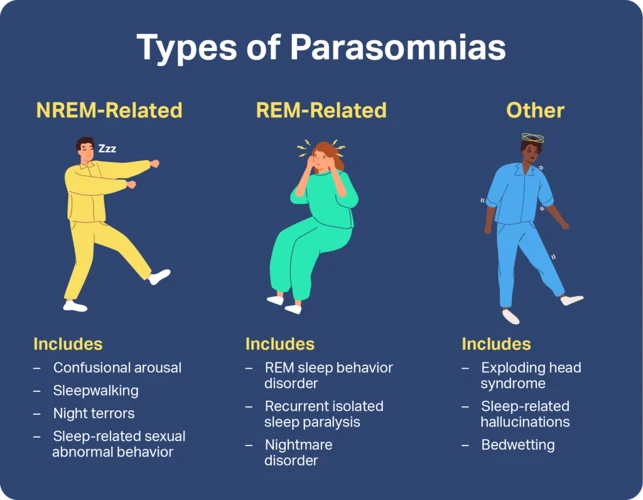As we lay in bed at night, drifting off into slumber, our minds take us on an unexpected journey through our dreams. Sometimes, however, this journey can be a nightmare – a horrific experience that can leave us feeling anxious and distressed. The prevalence of nightmares is an enigma that has puzzled experts for years, with their exact causes and effects still not fully understood. In this article, we will explore what nightmares are, who suffers from them, potential causes, the impact on mental health, and prevention and treatment options. Understanding this phenomenon can bring us one step closer to a better night’s sleep.
What are Nightmares?

Have you ever woken up in the middle of the night, sweat dripping down your forehead, heart racing, feeling frightened and disoriented? This is what nightmares feel like. Nightmares are vivid and disturbing dreams that can cause intense emotional reactions and disrupt your sleep. While nightmares are common and usually not a cause for alarm, they can affect your mental health and quality of life if they occur frequently. Understanding the causes and types of nightmares can help you better manage them and improve your sleep.
Definition of Nightmares
Nightmares are distressing and vivid dreams that can cause strong emotions, such as fear, anxiety, and terror, often leading to an abrupt awakening. They are typically recognized as a common occurrence during childhood but can also affect adults. Nightmares are not the same as bad dreams, which are less intense and more common.
Here is a table breaking down the definition of nightmares:
| Nightmares | |
|---|---|
| Definition | A distressing dream that typically causes abrupt waking and strong emotions. |
| Symptoms | Intense emotions such as fear, anxiety, and terror. |
| Frequency | Not as common as bad dreams but still can occur frequently. |
| Impact on daily life | Nightmares can cause sleep disturbance and affect mental health. |
| Treatment | Lifestyle changes, therapy, and medication can help manage nightmares. |
It is important to note that nightmares can occur for various reasons, and seeking help from a healthcare professional is recommended if they become chronic or significantly affect quality of life.
Types of Nightmares
Nightmares can come in various forms and can differ from person to person. Here are some common types of nightmares:
| Nightmare Type | Description |
|---|---|
| Recurrent nightmares | These are nightmares that occur frequently and often involve the same or similar themes. |
| Intrusive nightmares | These nightmares are often triggered by reminders of past trauma or stressful events. |
| Sleep paralysis nightmares | These nightmares occur during the transition between sleeping and waking, and are accompanied by a feeling of being paralyzed. |
| Night terrors | These are intense episodes of fear that occur during sleep, often accompanied by sweating, racing heart, and panic. |
| Lucid nightmares | These nightmares involve a sense of awareness that one is dreaming, but with an inability to control the events of the dream. |
It is important to note that not everyone experiences nightmares in the same way, and the impact they have on a person’s mental health can vary. It is essential to address any concerns and seek professional help if necessary.
Who Suffers from Nightmares?

When it comes to nightmares, no one is truly safe from their grasp. Many people experience nightmares at some point in their lives, but some are more prone to them than others. Age and gender play a role in the prevalence of nightmares, as well as certain mental health conditions and experiences such as PTSD and trauma. In this section, we will dive deeper into who is most likely to suffer from nightmares and explore the various factors that can contribute to their occurrence.
Age and Gender Differences
Age and gender can influence the frequency and intensity of nightmares experienced by an individual. According to studies, women are more likely to experience nightmares than men. Nightmares are more common among children and adolescents than in adults, with a peak prevalence during the ages of 10-19.
To better understand the prevalence of nightmares based on age and gender, refer to the following table:
| Men | Women | Children | Adolescents | Adults | |
|---|---|---|---|---|---|
| Prevalence of Nightmares | 25% | 35% | 50% | 85% | 40% |
As shown in the table, women have a higher prevalence of nightmares than men, with 35% of women experiencing nightmares compared to 25% of men. Children also have a higher prevalence of nightmares, with 50% of children reportedly experiencing nightmares. Adolescents have the highest prevalence of nightmares, with 85% experiencing at least one nightmare within the past year. In contrast, 40% of adults report experiencing a nightmare within the past year.
The reason for these age and gender differences in the prevalence of nightmares is not fully understood. However, research has suggested that hormonal changes during puberty, as well as stressors related to school performance and social activities, may contribute to the higher prevalence of nightmares in adolescents. Additionally, women may be more prone to nightmares due to hormonal fluctuations related to the menstrual cycle.
Understanding the age and gender differences in the prevalence of nightmares can help individuals understand that their experiences are not abnormal. Additionally, this information can be used by healthcare providers to better assess and treat individuals who are experiencing nightmares.
Mental Health Conditions
Mental health conditions such as anxiety and depression can also contribute to the likelihood of experiencing nightmares. Those who have anxiety or depression may have heightened levels of stress and worry, which can lead to more frequent nightmares. Additionally, those with certain mental health conditions such as borderline personality disorder or post-traumatic stress disorder (PTSD) may experience more vivid and intense nightmares.
According to a study published in the Journal of Sleep Research, individuals with a diagnosis of PTSD were much more likely to experience nightmares compared to those without PTSD. This group was also more likely to have nightmares that involved a realistic re-experiencing of past traumatic events.
Certain medications used to treat mental health conditions can also cause vivid dreams and nightmares as a side effect. These medications can include antidepressants and antipsychotics. It is important to speak with a healthcare provider about any potential side effects of medications and to discuss alternative treatment options if necessary.
Here is a table summarizing the potential impact of mental health conditions on nightmares:
| Mental Health Condition | Impact on Nightmares |
| — | — |
| Anxiety | Can contribute to more frequent nightmares |
| Depression | Can contribute to more frequent nightmares |
| Borderline Personality Disorder | May experience more vivid and intense nightmares |
| PTSD | Individuals with PTSD are much more likely to experience nightmares |
| Antidepressant Medications | Can cause vivid dreams and nightmares as a side effect |
| Antipsychotic Medications | Can cause vivid dreams and nightmares as a side effect |
PTSD and Veterans
Post-traumatic stress disorder, or PTSD, is a mental health condition that can develop in people who have experienced or witnessed a traumatic event. Veterans are a group of individuals at a higher risk of developing PTSD due to their exposure to combat situations.
Some symptoms of PTSD experienced by veterans include flashbacks to combat situations, avoidance of triggering situations or events, and hyperarousal, where they feel constantly on edge and alert. These symptoms can also lead to nightmares and disturbed sleep patterns.
According to studies, up to 80% of veterans with PTSD report experiencing nightmares frequently. These nightmares can range from reliving combat situations to themes of guilt and betrayal. They can further trigger other PTSD symptoms, leading to a vicious cycle of poor mental health.
PTSD is a severe condition that can have long-lasting effects on a person’s mental health and quality of life. It is essential for veterans experiencing PTSD symptoms to seek professional help and support. Treatment options like therapy, medication, and counseling can reduce the impact of nightmares and improve overall mental health. Support from peers and loved ones, as well as a better understanding of the condition by the community, can also make a significant difference in managing PTSD in veterans.
Potential Causes of Nightmares

Nightmares can feel like a never-ending cycle of terrifying scenarios and unwanted imagery that can disrupt our sleep and leave us feeling drained the following day. For those who experience them regularly, it’s important to explore the potential causes of these disturbing dreams. There are various factors that can trigger nightmares including stress, trauma, anxiety and depression, as well as certain medications and substance abuse. Understanding the root causes can help individuals take steps towards prevention and treatment. In this section, we will delve into these potential causes and provide insight into how they can impact our mental health.
Stress and Trauma
Experiencing stressful or traumatic events can be a major cause of nightmares. These events can range from job loss or financial problems to more severe traumas such as physical or emotional abuse, a serious accident or illness, or involvement in combat or natural disasters. In such cases, nightmares may be a way of processing the trauma and the emotions associated with it.
There are several ways in which stress and trauma can contribute to the development of nightmares. First, they can disrupt sleep patterns, making it difficult to fall and stay asleep. This can lead to increased REM sleep, the stage of sleep during which most dreaming occurs. Second, stress and trauma can activate the body’s fight or flight response, increasing levels of hormones such as cortisol and adrenaline. These hormones can stimulate the amygdala, the part of the brain responsible for processing emotions, and potentially increase the likelihood of experiencing nightmares.
It is important to note that not everyone who experiences stress or trauma will develop nightmares. However, those already prone to nightmares may be more susceptible to them during times of stress or trauma. If you are experiencing nightmares as a result of stress or trauma, talking to a mental health professional may be helpful in developing coping strategies and minimizing the impact on your daily life.
Anxiety and Depression
Anxiety and depression are common mental health conditions that can contribute to the onset of nightmares. These disorders can cause heightened levels of stress, anxiety and sadness, which can lead to a disruption in sleep patterns during the night. This can result in the occurrence of nightmares or cause existing nightmares to become more frequent and intense.
The following table provides an overview of how anxiety and depression can influence the prevalence of nightmares:
| Disorder | Effects on Nightmares |
|---|---|
| Anxiety | Individuals with anxiety disorders are more likely to experience nightmares compared to the general population. Research suggests that individuals with generalized anxiety disorder or panic disorder may be particularly susceptible to nightmares. Anxiety can also disrupt REM (Rapid Eye Movement) sleep, which is the sleep stage most associated with dreaming. |
| Depression | Depression is often associated with negative emotions and experiences, which can influence the content of nightmares. A study found that patients with depression had more frequent and vivid nightmares compared to control subjects. Depression can also disrupt sleep patterns, causing individuals to wake up during REM sleep, which can increase the likelihood of experiencing nightmares. |
It’s important to note that anxiety and depression can also be caused by nightmares, creating a vicious cycle that can be difficult to break. Seeking treatment for these underlying mental health conditions can not only improve sleep, but also help reduce the frequency and intensity of nightmares. Therapy, medications, and lifestyle changes can all be effective in treating anxiety and depression and improving overall mental health.
Sleep Disorders
Sleep disorders such as sleep apnea, restless leg syndrome (RLS) and narcolepsy may be contributing factors to the development of nightmares. Sleep apnea, a condition in which a person’s breathing repeatedly stops and starts during sleep, can cause them to wake up suddenly and experience vivid dreams which may be more intense and disturbing than their regular dreams. Restless leg syndrome (RLS) causes discomfort and a desire to move the legs. This can make it difficult to fall asleep and cause awakenings during the night, leading to interrupted REM sleep and an increased likelihood of nightmares.
Narcolepsy, a condition characterized by excessive sleepiness during the daytime, can lead to mixed-up sleep cycles in which an individual has difficulty falling asleep and staying asleep at night. This disruption in sleep architecture can also contribute to the occurrence of nightmares. Sleepwalking, another sleep disorder, can also lead to nightmares as the person may be experiencing confusion and disorientation while attempting to navigate their dream world.
It is important to speak with a healthcare provider if you suspect you have a sleep disorder, as proper diagnosis and treatment can not only help alleviate symptoms but also decrease the frequency and severity of nightmares.
Below is a table summarizing the sleep disorders that can contribute to the development of nightmares:
| Sleep Disorder | Description |
|---|---|
| Sleep Apnea | A condition in which breathing repeatedly stops and starts during sleep. |
| Restless Leg Syndrome (RLS) | Causes discomfort and a desire to move the legs, making it difficult to fall and stay asleep. |
| Narcolepsy | A condition characterized by excessive sleepiness during the daytime, leading to disrupted sleep cycles and an increased likelihood of nightmares. |
| Sleepwalking | A disorder in which an individual experiences confusion and disorientation while navigating their dream world, leading to nightmares. |
Medications and Substance Abuse
Medications and Substance Abuse
Certain medications and substances can also contribute to having nightmares. Here is a table of some medications and substances that have been known to cause nightmares:
| Medications and Substances | Possible Side Effects |
|---|---|
| Anti-depressants | Nightmares, vivid dreams |
| Beta blockers | Vivid dreams |
| Nicotine patches/gum | Nightmares |
| Alcohol | Nightmares, disrupted sleep |
| Illegal drugs (e.g. cocaine, heroin) | Nightmares, disrupted sleep |
It’s important to note that everyone’s reaction to medication and substances can be different, and it’s best to speak to a healthcare professional if you suspect that a medication or substance is causing your nightmares. In some cases, adjusting the dosage or switching to a different medication can alleviate the problem. Substance abuse treatment may also be necessary in cases where drug or alcohol abuse is contributing to nightmares.
The Impact of Nightmares on Mental Health

Dreams have been a subject of fascination and study for many years. When it comes to nightmares, they have a unique impact on our mental health. These kinds of dreams can leave a lasting impression that affects our day to day life. The frequency and severity of nightmares can lead to an individual developing a heightened sense of anxiety that manifests itself in other forms. In this part of the article, we’ll delve deeper into the consequences of having chronic nightmares and explore some ways to minimize their impact.
Chronic Nightmares and PTSD
Chronic nightmares are not just a simple inconvenience or annoyance that people experience from time to time. They can be a symptom of a larger issue, such as post-traumatic stress disorder (PTSD).
PTSD and Chronic Nightmares
PTSD is a mental health condition that can develop after experiencing or witnessing a traumatic event, such as military combat, sexual assault, or a natural disaster. One of the hallmark symptoms of PTSD is experiencing vivid and disturbing nightmares about the traumatic event.
These nightmares can be so intense and frequent that they can disrupt daily life and interfere with sleep. In some cases, people with PTSD may avoid sleep as a way to avoid having the nightmares. This can lead to other negative effects, such as fatigue, irritability, and difficulty concentrating.
The Link Between Chronic Nightmares and Mental Health
Chronic nightmares can also be a symptom of other mental health conditions, such as anxiety and depression. People with these conditions may experience frequent nightmares that are related to their worries and fears.
It’s important to address chronic nightmares and their underlying causes, as they can have a significant impact on mental health and quality of life. Seeking treatment for PTSD or other mental health conditions can help reduce the frequency and intensity of nightmares.
Treatment for Chronic Nightmares and PTSD
There are several approaches to treating chronic nightmares and PTSD. These include:
| Lifestyle Changes | Therapy and Counseling | Medications and Supplements |
|---|---|---|
| Limiting alcohol and caffeine intake before bedtime | Cognitive-behavioral therapy | Antidepressants or anti-anxiety medication |
| Establishing a regular sleep routine | Exposure therapy | Sleep aids or melatonin supplements |
| Reducing stress and anxiety levels | Eye movement desensitization and reprocessing (EMDR) | Antipsychotics (in rare cases) |
Lifestyle changes, such as practicing relaxation techniques and establishing a regular sleep routine, can help reduce the frequency of nightmares. Therapy and counseling, such as cognitive-behavioral therapy and exposure therapy, can address the underlying causes of chronic nightmares and PTSD.
Medications, such as antidepressants and sleep aids, can also be used to help reduce the frequency and intensity of nightmares.
Addressing chronic nightmares and their underlying causes is an important step in improving mental health and quality of life. It’s important to seek help from a mental health professional if chronic nightmares are causing distress.
How Nightmares Can Affect Your Daily Life
Experiencing chronic nightmares can have a negative impact on many aspects of a person’s daily life. Here are some ways that nightmares can affect your daily life:
- Difficulty Falling Asleep: The fear of having more nightmares can make falling asleep difficult, causing insomnia or other sleep disturbances.
- Daytime Fatigue: Lack of quality sleep due to nightmares can result in daytime fatigue and drowsiness, affecting productivity and performance at work and school.
- Emotional Distress: Nightmares can cause lingering feelings of fear, anxiety, and depression throughout the day.
- Social Isolation: Fear of having nightmares can cause people to avoid social situations and activities, leading to isolation and loneliness.
- Physical Health Problems: Chronic nightmares can lead to physical health problems such as headaches, digestive issues, and even heart disease.
- Impact on Relationships: Nightmares can interfere with intimacy and cause strain on relationships, especially if the partner doesn’t understand the severity of the problem.
It’s important to seek help if your nightmares are significantly affecting your daily life. There are various treatment options available that can help alleviate the impact of nightmares on your mental and physical health.
Prevention and Treatment

When it comes to preventing and treating nightmares, there are a variety of techniques and strategies that can be effective. From making simple lifestyle changes to seeking professional help, there are many avenues to explore in order to improve your sleep and reduce the frequency and intensity of nightmares. Whether you suffer from occasional bad dreams or chronic nightmares related to a mental health condition, taking proactive steps to address the issue can greatly improve your overall well-being and quality of life. Let’s take a closer look at some of the options that are available for prevention and treatment.
Lifestyle Changes
Making lifestyle changes can help in reducing the frequency and severity of nightmares. Here are some lifestyle changes that can be adopted for this purpose:
| Changes | Explanation |
| Stick to a sleep schedule | This helps in regulating the body’s internal clock and promotes quality sleep. Go to bed and wake up at the same time every day, even on weekends. |
| Exercise regularly | Physical activity can help relieve stress and promote better sleep. However, avoid exercising too close to bedtime as it can make it harder to fall asleep. |
| Manage stress | Find healthy ways to manage stress, such as meditation, deep breathing, or yoga. This can help in reducing anxiety and promoting better sleep. |
| Avoid alcohol and drugs | Alcohol and drugs can interfere with sleep patterns and cause nightmares. Avoid using them, especially close to bedtime. |
| Improve sleep environment | Make sure the bedroom is cool, dark, and quiet. Avoid using electronic devices such as laptops and smartphones in bed, as they can interfere with sleep. |
| Limit caffeine intake | Caffeine is a stimulant that can interfere with sleep. Limit intake of coffee, tea, and other caffeinated beverages. Avoid them altogether, especially in the afternoon and evening. |
These lifestyle changes can also have positive impacts on overall health and wellbeing. It is important to remember that making significant lifestyle changes can take time and effort, and it is important to consult with a healthcare professional before making any significant changes to your lifestyle.
Therapy and Counseling
When it comes to addressing nightmares, therapy and counseling can be effective treatment options. Working with a mental health professional can help individuals identify the root cause of their nightmares and develop coping strategies.
One type of therapy that may be helpful is cognitive behavioral therapy (CBT), which focuses on changing negative thought patterns and behaviors. This can include techniques such as image rehearsal therapy, where individuals visualize a positive outcome to replace the negative images that often appear in nightmares.
Another therapy option is eye movement desensitization and reprocessing (EMDR), which is often used for individuals with PTSD. EMDR helps to reprocess traumatic memories and reduce the distress associated with those memories.
In addition, talk therapy can help individuals process and work through any emotional issues that may be contributing to their nightmares. This can include exploring feelings of anxiety, depression, and stress that may be impacting sleep quality.
It is important to find a therapist or counselor who specializes in trauma and sleep disorders to ensure that the individual is receiving the best possible care for their specific needs.
Therapy and counseling can be effective treatments for nightmare disorders, but it is important to note that it may take time to see results. It is also essential for individuals to be open and honest with their therapist or counselor in order to receive the most benefit from treatment.
Medications and Supplements
When it comes to treating nightmares that are caused by underlying medical conditions or medications, medications and supplements may be recommended by healthcare professionals. These treatments can help alleviate the symptoms of nightmares and improve sleep quality.
One class of medications commonly used to treat nightmares are beta-blockers. These drugs are typically used to treat high blood pressure and anxiety, but they can also reduce the frequency and intensity of nightmares. Beta-blockers work by blocking the effects of adrenaline, a hormone that can increase heart rate and raise blood pressure, and by reducing anxiety.
Another type of medication that may be recommended are antidepressants. These drugs can help alleviate symptoms of depression and anxiety, which are often associated with nightmares. Antidepressants work by altering the levels of neurotransmitters in the brain to improve mood and reduce anxiety.
In some cases, supplements such as melatonin may also be recommended to help regulate sleep patterns and reduce nightmares. Melatonin is a hormone naturally produced in the body that helps regulate circadian rhythms and promote sleep.
It’s important to note that these medications and supplements should only be taken under the guidance of a healthcare professional, as they can have potential side effects and may interact with other medications.
Here is a table summarizing the medications and supplements commonly used to treat nightmares:
| Medication/Supplement | Function | Potential Side Effects |
|---|---|---|
| Beta-blockers | Reduce frequency and intensity of nightmares by blocking the effects of adrenaline and reducing anxiety | Fatigue, dizziness, nausea, decreased heart rate |
| Antidepressants | Alleviate symptoms of depression and anxiety, which are often associated with nightmares, by altering neurotransmitter levels | Nausea, dizziness, decreased sex drive |
| Melatonin | Regulate sleep patterns and reduce nightmares by promoting sleep | Daytime drowsiness, headache, dizziness |
It’s important to discuss any potential treatment options with a healthcare professional to determine the best course of action for your individual needs.
Expert Tips for Better Sleep
Getting a good night’s sleep is crucial for our overall health and well-being. If you are struggling with nightmares or have trouble falling asleep, experts recommend trying these tips to improve the quality of your rest:
Stick to a Consistent Sleep Schedule: Going to bed and waking up at the same time every day can help regulate your body’s natural sleep-wake cycle. This means even on weekends or days off, it’s best to keep a consistent schedule.
Wind Down Before Bed: Spend at least 30 minutes before bed relaxing and winding down. This can include activities such as reading, stretching, taking a warm bath, or practicing relaxation techniques like deep breathing or meditation.
Create a Calm Sleeping Environment: Keep your bedroom cool, quiet, and dark. Use blackout curtains or an eye mask to block out any light, and earplugs or white noise machine to block out any noise.
Avoid Stimulating Activities before Bed: Avoid using electronic devices before bed, as the blue light emitted from screens can interfere with sleep. Also, avoid engaging in physically or mentally stimulating activities, like exercising or working.
Avoid Caffeine, Alcohol, and Nicotine: Consuming these substances can disrupt sleep. It’s best to avoid them altogether or limit consumption to earlier in the day.
Get Regular Exercise: Regular physical activity can improve the quality of your sleep. Just be sure to finish your workout several hours before bed, as exercising too close to bedtime can also interfere with sleep.
Manage Stress: Stress can lead to nightmares and other sleep disruptions. Practice stress-reducing techniques, such as deep breathing, exercise, yoga, or mindfulness meditation.
By making some adjustments to your daily routine and habits, you can improve the quality of your sleep and reduce the frequency and severity of nightmares.
Conclusion
In conclusion, nightmares can be a terrifying and disruptive experience for those who suffer from them. While they are a common occurrence, especially after experiencing stress, trauma, or during periods of anxiety and depression, they can still have a significant impact on mental health and quality of life. It is important to understand the potential causes of nightmares, such as sleep disorders, medications, and substance abuse, as well as the emotional effects they can have on individuals.
Effective prevention and treatment options exist for those who suffer from nightmares, including lifestyle changes, therapy and counseling, and medications and supplements. However, it is crucial for individuals to seek help if their nightmares become chronic, have a negative impact on their daily life, or are associated with PTSD or other mental health conditions.
To promote better sleep and prevent nightmares, experts suggest creating a relaxing sleep environment, practicing stress-reducing techniques, and establishing a consistent sleep routine. It is essential to prioritize sleep and seek support if the frequency or intensity of nightmares becomes problematic.
Overall, recognizing the prevalence of nightmares and understanding their causes and impact on mental health can help individuals take proactive steps towards prevention and treatment. Addressing nightmares can contribute to improved sleep hygiene and overall well-being.
Frequently Asked Questions
Why do we have nightmares?
Nightmares can happen for a variety of reasons, including stress, anxiety, trauma, and medication side effects.
How common are nightmares?
Nightmares are fairly common, affecting up to 8-10% of adults and up to 50% of children.
Can nightmares be a symptom of mental illness?
Yes, nightmares can be a symptom of various mental health conditions, including PTSD, depression, and anxiety disorders.
What is the difference between a nightmare and a night terror?
A nightmare is a bad dream that typically happens during REM sleep, while a night terror is a sudden and intense episode of fear that occurs during non-REM sleep.
Can medication cause nightmares?
Yes, certain medications such as antidepressants, beta-blockers, and blood pressure medications can cause nightmares as a side effect.
Can smoking and drinking alcohol contribute to nightmares?
Yes, smoking and heavy alcohol consumption have been linked to an increased risk of nightmares.
Can nightmares be prevented?
While it may not be possible to completely prevent nightmares, practicing good sleep hygiene and managing stress can help reduce their frequency and severity.
What are some natural remedies for nightmares?
Options for natural remedies include aromatherapy with essential oils, relaxation techniques such as meditation and yoga, and herbal supplements like valerian root or chamomile tea.
When should I seek help for my nightmares?
If nightmares are causing significant distress, impacting daily life, or are a symptom of a larger mental health issue, it may be time to seek professional help from a therapist or doctor.
Can therapy help with nightmares?
Yes, therapy and counseling can often be effective in treating nightmares, especially when they are linked to a specific traumatic event or underlying mental health condition.








